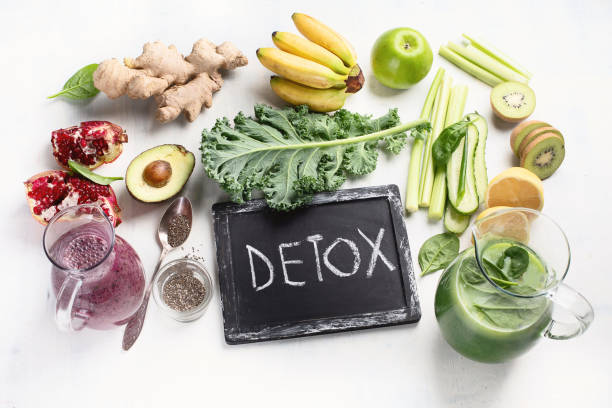The beginning of a new year seems like the ideal time to hit reset on a lot of things in your life, especially — after all that holiday indulging — your diet. And programs that claim to help you do just that through a “detox” or “cleansing” regimen remain popular despite a marked lack of evidence that they actually work.
Most plans are grounded in the idea that flushing toxins out of your system, often through a liquid-only diet with plenty of water, and giving your digestive system a break from its regular role can bring about miraculous results, from weight loss to more energy to glowing skin. The only problem, experts say: There is zero evidence to support any of that.
What Are Detoxes and Cleanses, and How Did They Get So Popular?
The modern detox movement grew out of largely naturopathic origins. After all, until the last decade or so, detoxing was medical jargon for treating serious conditions, such as alcohol poisoning or kidney failure. But in homeopathic circles, the idea of purifying the body and flushing out toxins took root and grew alongside the movement to “eat clean.”
Most cleanses claim that unspecified toxins — from nonorganic foods, environmental pollution, and other chemical contaminants — are wreaking havoc on our bodies, taxing our digestive systems, and leading to weight gain and serious ailments. They promise to cure these ills by a designated period of fasting or restricting solid foods or certain kinds of foods (alcohol, sugar, gluten, or dairy), often supplementing juices or other drinks as a source of vitamins and minimal calories. Drinking lots of water is also a key component in many popular cleanses and detoxes.
The terms “detox” and “cleanse” are mostly used interchangeably. Most plans fall into one of three major categories: those that replace solid food with liquid sustenance (juices, smoothies, or soups, sometimes with herbal supplements thrown in); those that claim to support your body’s natural detoxification systems by supplying nutrients that boost liver and kidney function; and those that focus on cleansing your digestive system from the opposite end, the colon.
What Scientific Research and Experts Say About These Diet Programs
Nutrition experts don’t buy into the idea that we need any additional help eliminating toxic substances. “Our bodies naturally detox themselves every single day,” says Keri Gans, RDN, owner of Keri Gans Nutrition in New York City and author of The Small Change Diet. “That’s why we have a liver and kidneys.” In other words, every time you pee, poop, or sweat your butt off at the gym, you’re getting rid of waste products that could otherwise harm your body. Not to mention, no randomized controlled trials — the gold standard for scientific research — have ever found that giving your gastrointestinal (GI) system a break from digesting food is beneficial in any way.
Gans believes that one of the reasons detoxes and cleanses may have gained so much traction is they do help people feel better initially, particularly if they were eating a diet rich in processed or packaged foods, to begin with. “More energy is one of the big claims these diets make,” she says, “and if you’ve been eating a traditional Westernized diet, one with lots of sugar and processed food, then cutting all that out will make you feel less lethargic — at first.” But after two or three days, she says, surviving on so few calories and little to no protein or healthy fat takes a toll, and people complain of fatigue.
Maybe the best thing that can be said about cleanses is they’re a good psychological tool for helping to cut back or eliminate unhealthy components of your diet, like sugar or alcohol. “Don’t think of it as a long-term plan,” says Zeitlin. “If you’re dead set on doing a cleanse, keep it short, like maybe two to three days before your best friend’s wedding or another big event, and be aware of the risks. Yes, you’re going to lose weight quickly because you’re restricting calories. But as soon as you go back to eating normally, you will gain it all back — and possibly more.”
What Experts Think About Liquid Cleanses for Weight Loss
There was a time when juice was considered a kids’ drink — and not a very healthy one, at that. That was before companies like Pressed made cold-pressed a household term. On a juice cleanse, only the extract squeezed from fruits and vegetables is consumed for anywhere from one day to two weeks. Many come prepackaged and delivered to your doorstep, sold by companies that claim that juice provides all the nutrition you need while keeping your digestive system from being taxed.
While one study found that fresh juices did contain even higher amounts of the immune-boosting antioxidant vitamin C than blended drinks made with whole fruits, in most other nutritional categories, liquids fall short. (1)
“A lot of times, juices will propose to have a lot of vitamins or minerals in them,” says Gans. “But it’s not enough to sustain an individual long term. Most of them lack in protein, fiber, fat, and calories.” Those are all nutrients that trigger satiety and, therefore, help prevent overeating and weight gain. “It is extremely difficult for the average person to meet his or her nutritional needs in less than 1,200 calories a day,” Gans continues. “Most juice cleanses are 800 calories or fewer.”
Additionally, even juices without added sugar tend to be high on the glycemic index, which means your blood glucose levels will spike and then fall dramatically after consuming them, particularly without other food in your stomach to blunt this effect. That can lead to hunger and fatigue. Also, says Gans, “If you’re on them too long, you’ll be missing out on important nutrients, which can put you at risk for malnutrition.



